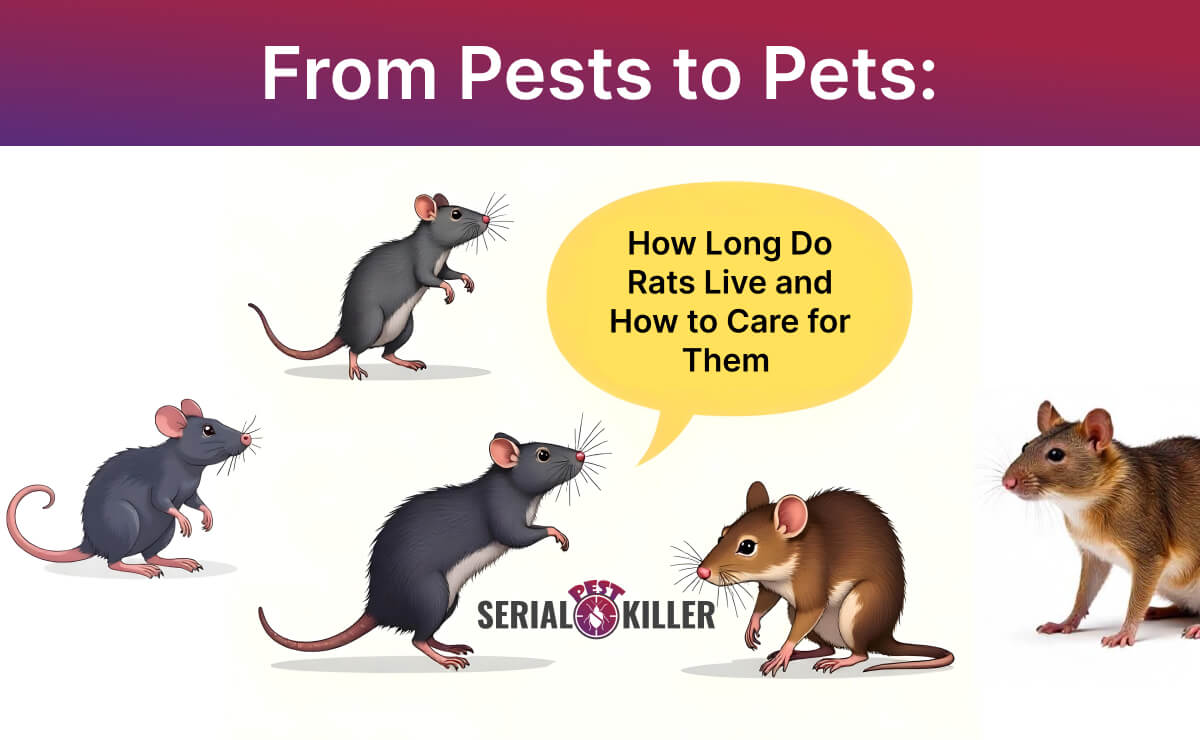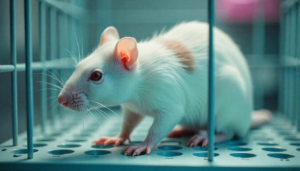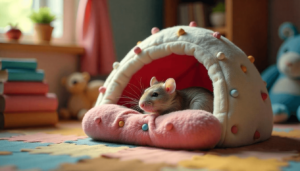
Have you ever wondered how long rats live? Knowing a rat’s lifespan should be fundamental for anyone who needs to manage rat pests or care for their pet rat. Knowledge of their life stages allows you to establish efficient pest control measures. Pet owners can use this information to improve their pets’ care and achieve extended lifespans.
These small creatures hold important positions in our daily existence since they happen both as house pests and as pet companions. Multiple factors, such as environmental quality along with diet and genetics, influence how long rats live and understanding these critical aspects changes your approach toward them.
Several years previously, I confronted a significant rat infestation inside my home. Learning about their lifecycle proved essential to discovering an effective solution. On another occasion, caring for pet rats showed me how proper care can improve their quality of life.
How Long Do Rats Typically Live?
The expected lifetime of rats depends significantly on their living conditions and surrounding elements. Let’s break it down into three main categories:
Wild Rats
In their natural habitat, wild rats typically survive between one to two years while enduring ongoing threats to their existence. The survival of rats depends on their outcome against predators consisting of cats as well as birds of prey and snakes. Rats experience shortened lifespans because harsh weather conditions combine with restricted access to food supplies. Disease serves as a principal life-shortening factor because wild rats encounter numerous infections and parasites.
Pet Rats
A controlled environment provides pet rats with safety, resulting in the extension of their lifespan beyond average estimates. Proper care can lengthen their lifespan beyond 2 to 3 years, reaching 4 years in selected situations. A pet rat enjoys a longer productive life with better welfare through routine veterinary care combined with excellent food and proper companionship.
Lab Rats
Rats under laboratory conditions experience standardised feeding routines without encountering natural predators and health-threatening illnesses. Rats can survive between two and four years except when involved in research where specific care levels affect their lifespan. However, ethical concerns about their treatment in laboratory environments remain a topic of discussion.

Factors That Affect a Rat’s Lifespan
Both biological and behavioural factors determine the lifetime span of a rat no matter where they live, either in the wild as household pets or in scientific research facilities. Let’s explore the most important ones:
1. Environment: Indoor vs. Outdoor Living
The environment in which a rat lives determines how long it will survive. Rats who live in the wild must survive numerous natural predators while enduring harsh climate conditions and continuing their daily food search. Pet rats live longer when they stay indoors because their caretakers provide protection and proper feeding, which helps extend their life span.
2. Diet: Importance of Proper Nutrition
Proper nutrition is the fundamental factor determining how long a rat will live. Wild rats consume whatever food they can find available, yet this food usually fails to meet their nutritional requirements. Pet rats require balanced nourishment by consuming fresh produce alongside grains and vegetables and high-quality pellet food. The proper diet helps prevent illnesses and enables rats to live longer.
3. Health Care: Common Health Issues in Rats
Health problems frequently affect rats in the form of respiratory infections, together with tumours and dental complications. Wild rats typically die from sickness because they have no medical attention, yet pet rats who receive veterinary care have prolonged, healthier lives. Timely medical examinations combined with proper treatment deliver substantial results.
4. Genetics: Role of Hereditary Traits
A rat’s lifetime duration is determined by the genes that formed its biological structure similar to how human longevity works. Specific rat types naturally survive longer compared to other rat breeds. For example, lab rats bred for research often have better-controlled genetic traits, leading to slightly longer lifespans under ideal conditions.
Using available knowledge about these factors enables better pet rat care decisions and more efficient pest management strategies.
For Pest Control: How Knowing Rat Lifespan Helps
The knowledge about how long rats live serves as instrumental information for effective pest management procedures. Understanding rat reproduction and lifespan enables effective life cycle interruption through strategic pest prevention plans.
1. Understanding the Rat Lifecycle
The rat population expands rapidly because female rats can produce a new litter every 3-4 weeks. The understanding of rats’ typical wild survival span of 1-2 years helps you optimize pest control activities. You can effectively lower their population when you conduct pest control during their breeding periods.
2. Prevention Tips Based on Lifespan Knowledge
By understanding how quickly rats can infest your home, you can focus on preventative measures like:
⦁ Sealing Entry Points: Stopping rats from entering through tiny holes or spaces in the walls.
⦁ Removing Food Sources: Proper food storage and trash safety, along with regular cleaning of crumbs, serve as preventive measures.
⦁ Maintaining Cleanliness: Leave no nesting materials present around your property, including clutter or debris.
3. Personal Insights: Lessons From a Home Infestation
I encountered a significant home rat infestation a few years back. When I started my initial efforts with traps and poisons, they failed to work as I expected. Researching their lifecycle helped me understand that solving the core problem required preventing rats from entering the area and stopping reproduction to end the infestation. Sealing potential entrances along with removing food sources helped me finally reclaim control.
The key takeaway? Life cycle knowledge enables you to make speedy decisions that lead to money and time savings throughout the duration of an issue.
For Pet Owners: How to Help Your Rat Live Longer
As a responsible owner of pet rats you want to guarantee they enjoy both a prolonged healthy life as well as continual happiness. By giving proper care, you can lengthen their lifetime and provide enhanced levels of well-being.
1. Proper Diet for Pet Rats
Your pet rat depends on a balanced diet, which acts as essential nutrition for its health. Your rat needs different nutrition, including quality rat pellets paired with fresh produce and vegetables and periodic protein selections, which may include eggs or cooked chicken. The diet of your pet rat should always exclude processed foods together with sugary treats and fat-rich meals because obesity, along with health complications, might ensue.
2. Enrichment: Toys and Socialization
These intelligent social animals showcase remarkable interactive abilities. Aspects such as toys, climbing structures, and tunnels enable physical and mental wellness in rats. Habitual contact between rats and their owner or other rat mates helps combat loneliness and stress, which can impair their wellness.
3. Vet Care: The Importance of Regular Checkups
The body of a rat is susceptible to developing respiratory infections and tumours. An experienced vet who specialises in small animals can detect and manage health issues in the early stages through regular veterinary appointments. Basic preventive measures such as regular nail trimmings and proper cleaning of their habitat are key elements for sustaining their well-being.
4. Personal Anecdote: Extending the Life of a Pet Rat
My pet rat named Buddy exceeded a lifespan of 3 years, providing me with delightful companionship. His extended lifespan came from eating properly while living in a clean environment and visiting a vet for medical checks. Daily periods with my pet prolonged his happiness and allowed me to identify his minor health transformations before serious problems developed.
The combination of measured diet control environment optimization and regular veterinary exams enables your pet rat to enjoy increased longevity while maintaining optimal health.
Common Questions About Rat Lifespan
The lifespan of rats remains a matter of curiosity for numerous individuals who either keep them as pets or deal with their invasive presence. Here are answers to some of the most common queries:
1. Do Rats Live Longer in Captivity Than in the Wild?
Rats that live in captive settings like petriages normally experience an increased lifespan compared to their wild counterparts. Pet rats typically survive twice as long or more than their wild counterparts because controlled living environments with proper feeds and medical support enable them to reach ages from 2 to 3 years and beyond.
2. What’s the Oldest Recorded Rat?
The longest-lived recorded rat exceeded 7 years because of the dedicated care provided to it. The rat survival record exceeding 7 years demonstrates that exceptional nutritional care and environmental provisions combined with desirable genetic factors can enhance the lifespan of these animals.
3. Can Diet and Exercise Really Extend Their Life?
Absolutely! A combination of proper nutrition with regular exercise protects rats from obesity alongside other medical issues. Dietary conditions and suitable physical exercise patterns enable rats to experience longer lifespans and better overall health during their lifetime.
4. How Can Understanding Rat Lifespans Improve Pest Control Effectiveness?
Predicated information about rat lifecycles helps pest controllers make their strategies more effective during rat reproduction stages. Learning about their rapid breeding capabilities lets you develop strategic approaches to interrupt their population cycle, thus stopping infestation escalation.
Practical advice paired with answers to typical concerns emerges from these insights for managing pets and eliminating pests.
Real-Life Experiences with Rat Lifespans
The lifespan of rats can be very different and depends on the conditions of the rats’ environment and how the rats are cared for. In my experience, wild rats rarely live beyond a year due to constant threats like predators, harsh weather, and diseases. However, pet rats cared for properly, have been known to live 3 or perhaps more years. This great difference points to the need for safe and nurturing environments to help them live longer.
Once, I had a pet rat named Milo that lived to be over 3 years old. While ageing, he began to slow down and also experienced health problems such as respiratory infections and joint stiffness. Through daily care and regular vet checkups, a clean and stimulating habitat, and a balanced diet, I made his last years a comfortable and fulfilling chapter to his life. I learned from his story how much a rat’s life can change by attentive care.
Dealing with rats, be it pets or pests, can also be an emotional road. Although I worked to remove them during a rat infestation in my home, I grew to appreciate their intelligence and resourcefulness. Yet, for pet owners, the task of saying goodbye to a beloved rat is especially painful because, in nature, they tend to have a relatively short lifespan. These experiences highlight the importance of how we understand and care for them — no matter if it is to control their existence or care for them as dependent companions.
What to Do With Your Last Rat When You Don’t Want More
1. Rehoming Younger and Healthy Rats
Rehoming is a great option if your last rat is young and healthy. Contact local adoption groups, online pet communities or people who already love rats. As a result, they end up finding a new home with other rats, who provide them with care and companionship so that they can truly thrive.
2. Caring for Older or Sick Rats
If you have older or unwell rats, rehoming might not be the best option for them as it means accepting the stress of moving to a new environment. Instead, you should concentrate on making their remaining days comfortable and stress-free at home. Give them extra time, keep the activities enriching, and the living space clean. Hand-feeding their favourite treats to them or snuggling with them is a very small gesture,e but it can still bring them joy and comfort.
3. Honoring Their Final Days
Taking care of a lone rat takes a lot of patience and compassion. Make an additional effort to dialogue with them as much as possible so that they do not get lonely and time is spent with them full of love and compassion. Not only does this help your rat, but you’ll be able to cherish the bond you’ve shared.
Tips for Effective Pest Control
To effectively deal with rats, many approaches are required: prevention, smart tactics and professional help. They’ve got a short lifespan, and once you understand rat behaviour, you can help tackle infestations before they become out of hand.
1. Prevention First
However, the best way to get rid of rats is to prevent them from entering the home to begin with. Begin by blocking every possible entry point to your home, including cracks in doors, walls, and windows. Clean up crumbs, seal trash bins, and store food in airtight containers to remove food sources. Cleaning your home is important and getting rid of clutter removes nesting opportunities for rats.
2. Choosing the Right Traps and Baits
Baits and traps are the best option if rats have already moved in. Traditional traps and baits are effective for controlling populations, and humane traps are a good option if you want to release the rats elsewhere. Rats will adhere to familiar paths and always place traps along walls or near signs of activity.
3. Understanding Rat Habits
Rats reproduce rapidly and females can have large litters every few weeks. Understanding the life cycle and the habits of pests helps you determine the best time to schedule your pest control methods which will stop the cycle of their breeding and stop infestation. For a long example, targeting rats while they are small in population will prevent further problems down the road.
4. Hiring Professional Pest Control Services
In some cases, you might find that a rat infestation is just too massive or complicated to deal with on your own. Most cases will require professional services, and doing it yourself will only bring temporary relief. They know what to do and possess the tools and expertise to resolve even the toughest infestation, saving you time and stress.
With a mix of prevention, taking action on time, and professional support where necessary, rat infestations are manageable and curable.
Emotional Challenges of Keeping Rats (Pet Owners)
Rats can make excellent pets, but due to their short lifespans, it can come at an emotional cost to owners. It is hard to let these intelligent and affectionate creatures go when their time is up, especially when you have built a bond with them. Here’s how to get around those emotional hurdles.
1. Coping with Their Short Lifespan
Most rats live only 2-3 years, and these years can feel heartbreakingly short. When pet owners lose their pet, they tend to feel the sense of loss sooner than that. This facing reality and focusing on giving them the best life you can during the time they are yours alleviates some of the pain.
2. Avoiding the “Lone Rat” Situation
Rats are social creatures and feel lonely and stressed when they have only one rat. It is not uncommon for owners to space out the ages of their rats instead of suddenly having one parent rat that’s too old. The rats will not be left alone, thus ensuring that when one rat dies, there is a companion for the remaining rat to avoid the emotional stress of losing the companion.
3. Deciding Whether to Get More Rats
After losing a rat, most owners have a hard time deciding whether or not to adopt more. Some relish the idea of bringing home new rats but for others, it’s a question of first going through the grieving process before being prepared to commit again. It all depends on just how ready you are for it and what your personal circumstances are.
Taking care of rats involves highs and lows, but the joy and companionship are what they provide are more than their difficulties.
Conclusion:
Whether as pests or pets, rats can significantly affect our lives, and knowing how long our rats live helps us make sound decisions about managing or caring for them. Pet rats live much longer than wild rats, especially if we take good care of them. Knowing the factors that influence how long their lives are (diet, environment, healthcare) can help you control or give your pet rats the best life possible.
Understanding a rat’s lifecycle helps to understand how to break the breeding cycle and prevent infestation for pest control purposes. In addition to focusing on enrichment, proper nutrition and regular veterinary care, pet owners can add precious time to their rat’s life. By using this guide, you can create healthier environments for both yourself and the rats you encounter, fostering better outcomes for everyone involved.
FAQs About Rat Lifespan
1. Can a Rat Live for 12 Years?
No, rats cannot live for 12 years. The average lifespan of a rat ranges between 1 to 3 years, depending on whether they are wild or domesticated. Even with exceptional care, a lifespan beyond 4 years is extremely rare.
2. What Is the Lifespan of a House Rat?
House rats, also known as wild rats, typically live for 1 to 2 years. Their survival is influenced by external factors like predators, food scarcity, and disease. In controlled environments, such as research labs, they may live slightly longer.
3. How Long Do Wild Rats Live?
Wild rats generally live for about 1 year, though some may survive up to 2 years under favorable conditions. The short lifespan is mainly due to predators, harsh environments, and limited access to consistent food sources.
4. Are Rats Friendly to Humans?
Yes, domesticated rats (pet rats) are extremely friendly and social animals. They form bonds with their owners, enjoy playing, and can even learn tricks. Wild rats, however, tend to avoid humans and can become aggressive if cornered.


